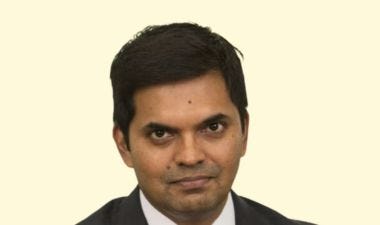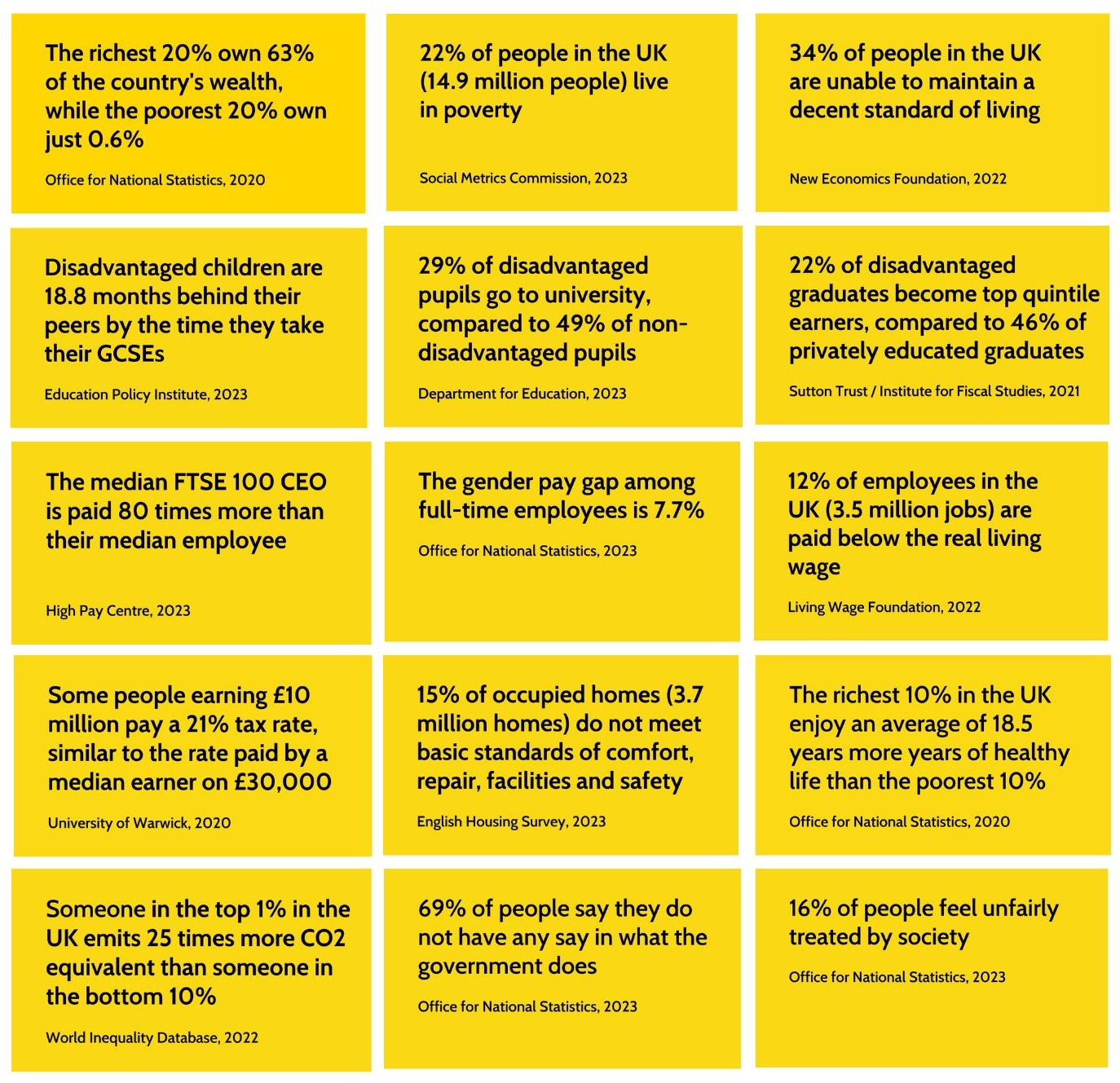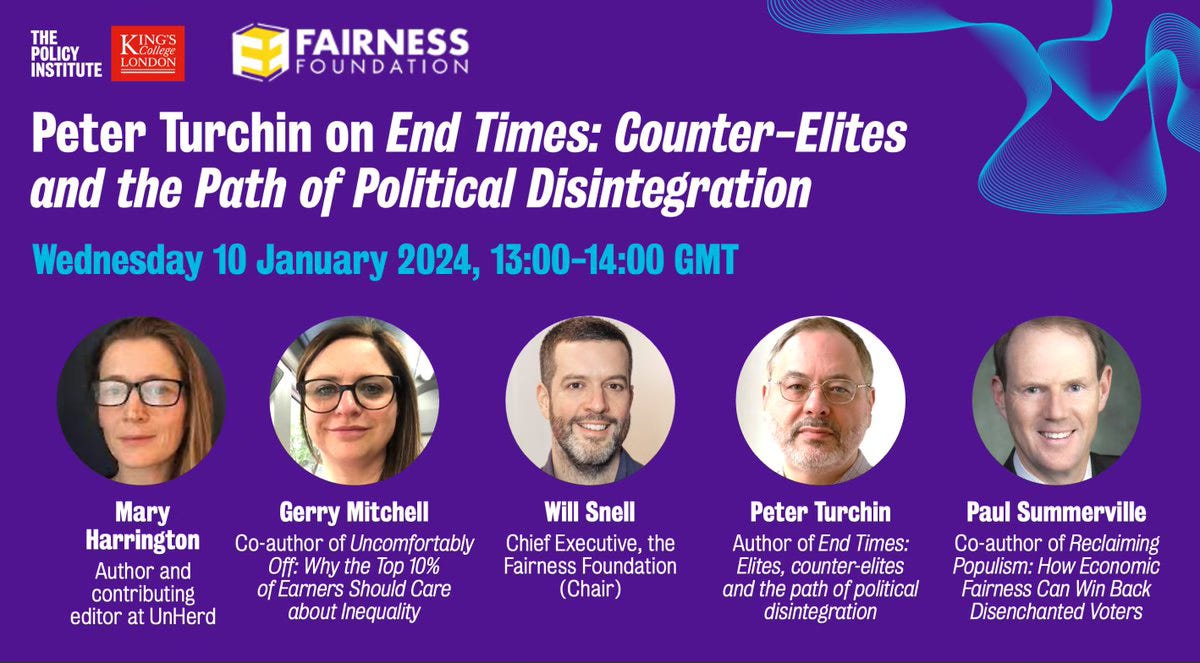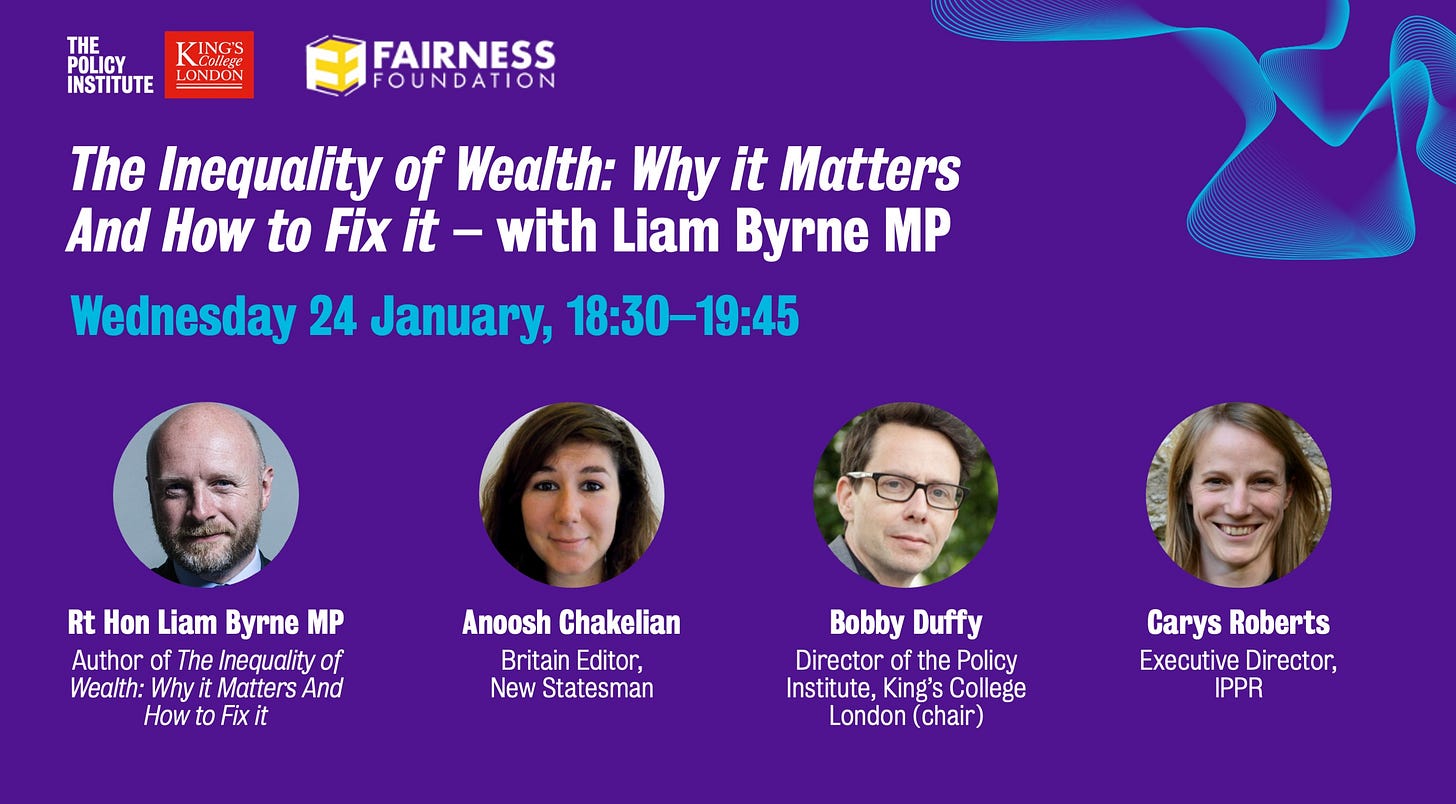Updating the Fairness Index
The latest version of our online tool incorporates new data and some new indicators on wellbeing from the Office for National Statistics
In October 2022 we published the Fairness Index, an online tool to examine and explain the nature, causes and consequences of key inequalities in the UK.
We’ve just given it a new year once-over. Several of the indicators have been updated with the latest stats from the data publishers, and we’ve swapped out two indicators (on council tax and tax enforcement) for two new ones, from the ONS wellbeing dashboard, on ‘voice’ and ‘fair treatment’.
You can browse the updated index at https://fairnessfoundation.com/fairness-index.
It’s structured around our five fair necessities, and aims to measure how far the five ‘fair necessities’ have been realised in the UK, to provide an answer to the question - do we live in a fair society? (Spoiler alert - no).
The indicators (previewed in the image at the top) are as follows:
Wealth: Percentage of wealth held by the richest 20% and poorest 20%
Poverty: Percentage of people living in poverty
Living standards: Percentage of people unable to afford an acceptable standard of living
Secondary school: GCSE attainment gap for disadvantaged pupils
Higher education: Difference between percentage of disadvantaged and non-disadvantaged pupils who go to university
Graduate outcomes: Difference between percentage of disadvantaged and privately educated graduates who become top quintile earners
Executive pay: Pay gaps between CEOs and average employees
Equal pay: Gender (and ethnicity and disability) pay gaps
Low pay: Percentage of employees paid less than the real Living Wage
Income tax: Difference between the effective average tax rates of top earners and median earners
Housing quality: Percentage of homes that are classified as non-decent
Health outcomes: Healthy life expectancy gap between rich and poor
Carbon emissions: Difference in per capita CO2 emissions between rich and poor
Voice: Percentage of people who think they have a say in what the government does
Fair treatment: Percentage of people who say they feel unfairly treated by society
The qualitative section of the index looks at the underlying issues in much more depth, drawing on the indicators and exploring the statistics behind them (e.g. regional and group breakdowns and overseas comparisons), the substance of the issues (including why the inequalities identified are unfair), real-life stories, survey data showing public attitudes, and practical solutions.
Upcoming events
Peter Turchin on End Times: Counter-Elites and the Path of Political Disintegration
Wednesday 10 January, 13:00 to 14:00 (UK time) on Zoom
What factors drive political turmoil and societal breakdown? How do elites sustain their dominance, and why do ruling classes occasionally lose their hold on power?
Peter Turchin, an expert in researching the origins of political instability, uncovers a recurring trend. When the scales of power heavily favour the ruling elite, it leads to a surge in income inequality, enriching the wealthy and impoverishing the less privileged. As more individuals aspire to join the elite, dissatisfaction with the established order intensifies, often resulting in calamity.
Join the Policy Institute and the Fairness Foundation for a conversation about political upheaval, inequality, and the historical lessons we can glean. Are we truly living in "End Times," or can history provide a glimmer of optimism for breaking free from past cycles?
Speakers
Gerry Mitchell, Social policy researcher, writer, community activist and co-author of Uncomfortably Off: Why the Top 10% of Earners Should Care about Inequality
Will Snell, Chief Executive, the Fairness Foundation (Chair)
Mary Harrington, author and contributing editor at UnHerd
Paul Summerville, Adjunct Professor, Gustavson School of Business at the University of Victoria and co-author of Reclaiming Populism: How Economic Fairness Can Win Back Disenchanted Voters
Peter Turchin, Complexity Scientist, one of the founders of Cliodynamics and author of The Times thought book of the year, End Times: Elites, counter-elites and the path of political disintegration
The Inequality of Wealth: Why it Matters and How to Fix it
Wednesday 24 January, 18.30 to 19.45 (UK time)
8th Floor (North Side), Bush House, 30 Aldwych, London WC2B 4BG
IN-PERSON TICKETS NOW SOLD OUT BUT LIVESTREAM TICKETS AVAILABLE
The super-rich have never had it so good – but millions can't afford a home, an education or a pension, argues former Treasury minister Liam Byrne MP in his new book, The Inequality of Wealth: Why it Matters and How to Fix it.
He says that unless we change course soon, the future will be even worse. Much worse. But things don't have to be like this. In the book, Byrne explains why wealth inequality has grown so fast in recent years; warns how it threatens our society, economy and politics; shows where economics has got it wrong – and proposes five practical ways to rebuild an old ideal: the wealth-owning democracy.
Join the Policy Institute and Fairness Foundation for this event in our Fair Society series.
Speakers
The Rt Hon Liam Byrne MP, Member of Parliament for Birmingham Hodge Hill and author of The Inequality of Wealth
Anoosh Chakelian, Britain Editor, New Statesman
Carys Roberts, Executive Director, Institute for Public Policy Research
Professor Bobby Duffy, Director of the Policy Institute at King’s College London (chair)
Our expert contributors
Welcome to new members of our expert contributors network






We are delighted to welcome the following distinguished new members of our expert contributors network:
Kate Pickett (Professor of Epidemiology, University of York)
Richard Wilkinson (Professor Emeritus of Social Epidemiology, University of Nottingham)
Rajesh Chandy (Professor of Marketing and Academic Director of the Wheeler Institute for Business and Development, London Business School)
Louise Ashley (Associate Professor, School of Business and Management, Queen Mary, University of London)
Jake Anders (Associate Professor and Deputy Director of the Centre for Education Policy and Equalising Opportunities, University College London)
Ingrid Robeyns (Chair in Ethics of Institutions, Utrecht University)






